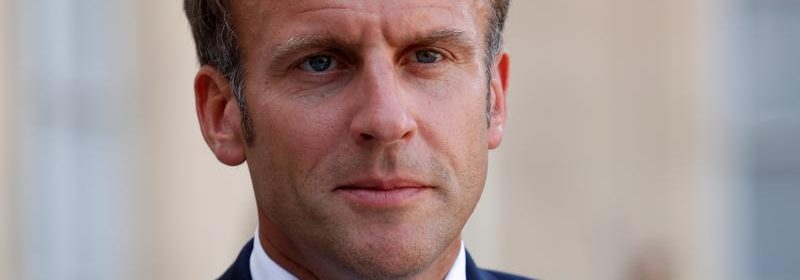Exclusive-Macron's secret campaign team points to conservative battle ahead

PARIS (Reuters) – French President Emmanuel Macron is building an election campaign machine stacked with former conservative insiders, because he has realised he needs to win over more centre-right voters to secure a second term next year.
Macron, 43, has not declared his candidacy. But two sources close to the president told Reuters that behind closed doors the campaign team was taking shape, with one-time members of former centre-right president Nicolas Sarkozy’s party among those who will shape the campaign.
The prominent role given to ex-Sarkozy loyalists gives clues to the policies they will run with in a campaign that will see a focus on immigration and identity, but also the economy and purchasing power at a time of surging energy prices.
The long-held belief that the April run-off would be a repeat of the duel between Macron, once a minister in a Socialist government, and far-right leader Marine Le Pen has been upended by the rise of a far-right polemicist, Eric Zemmour Right-wing chat-show celebrity may alter France’s election dynamics.
His ascent, however, has split the far-right vote and may present the centre right with an open door to the second round — the most dangerous scenario for Macron, polls show.
In the clearest sign of where he thinks the battle of 2022 will be fought, Macron has picked his overseas minister Sebastien Lecornu, a 35-year-old former conservative prodigy, to run the campaign, the two sources and a third source also close to Macron said – although, as in 2017, the role will be unofficial and will not be made public.
Lecornu entered politics canvassing for Sarkozy when he was 16. He became mayor of a small town in Normandy when he turned 18 and then Sarkozy’s youngest government adviser at the age of 22.
“He tasked Lecornu with the campaign,” one of the sources said. “Lecornu will deny it if you ask him. Because confirming would mean the president is running.”
A source in Lecornu’s entourage neither confirmed nor denied the role, building on his campaign experience as two-time mayor, a senator and regional head, but said: “He’s a real grassroot political activist. And that’s a competitive advantage: in the Macron world, there aren’t many elected officials.”
Macron himself had never held elected office before becoming president.
Asked about Lecornu, Macron’s office said: “It doesn’t mean anything, we’re not in a campaign as you know, the president is not a candidate.”
DRIFT RIGHT
The conservative tone marks a shift from the strategy of Macron’s 2017 campaign when the former investment banker ran as a political outsider who proclaimed to be neither of the left nor right and dynamited the country’s mainstream parties.
Then, it eventually emerged his campaign had been managed by a little known Socialist party figure, Jean-Marie Girier, who has had a low profile since.
During a presidency dogged by waves of social unrest over his pro-business economic reform package and militant attacks, Macron’s policymaking has drifted to the right.
“It’s clear the centre of gravity of the campaign will be on the right,” a government source said.
The rise of the conservatives in Macron’s camp is causing unease among some of the left-leaning team who helped propel him to the presidency in 2017, widely dubbed the “Macron Boys” by the media as they were mostly men in their 20s and 30s.
One of the three sources, with a background from the political left, said he had been told Lecornu would run the campaign. “I’m not a fan (of Lecornu). But like in 2017, the real campaign manager will be Macron himself.”
Macron will still seek to maintain centrist appearances by giving prominent public roles to two rising stars from left-wing backgrounds, Clément Beaune, his Europe minister, and Gabriel Attal, his government spokesman, two of the sources said.
NUMBER ONE TARGET
Opinion polls show the challenger who would give Macron the hardest fight in a second-round run-off vote would be Xavier Bertrand. One survey this month projected a razor-thin 51%-49% win in Macron’s favour.
Presidential strategists say he will defend his ground on immigration, national identity and security, traditional electoral turf of the political right and that Macron’s best prospect for poaching more centre-right voters lies in the economy.
One of the sources who identified Lecornu as campaign chief said they expected Le Pen and Zemmour to pull the centre-right further to the fringes on immigration and identity, alienating conservative voters more concerned by economic matters.
“We want to win the economic right, which is already two-thirds ours. Our number one target is the remaining third,” the source said.
Even before Macron crafts a detailed manifesto, another conservative renegade has been the architect of Macron’s backroom deals to undermine his old political family.
Thierry Solere engineered a damaging row within the centre-right Les Republicains party when he brokered a deal with the party’s candidate and Macron’s centrist party during regional elections in Provence this summer, one of the sources said.
Amid the fallout, he then wooed the influential centre-right mayors of Nice and Toulon, who, after negotiations, endorsed Macron for the 2022 race to the detriment of their party’s own eventual candidate.
Solere’s actions demonstrate a belief that five years after sweeping to power by promising to do away with the “old world” of French politics, Macron’s prospects of a second mandate hang on the age-old ploy of encroaching on your rival’s territory rather than a wholesale redrawing of the political landscape.
“We can’t play the ‘change’ card this time round. He’s an incumbent. We need to go back to some of the tricks of the old world,” one of the sources said.
Source: Read Full Article
